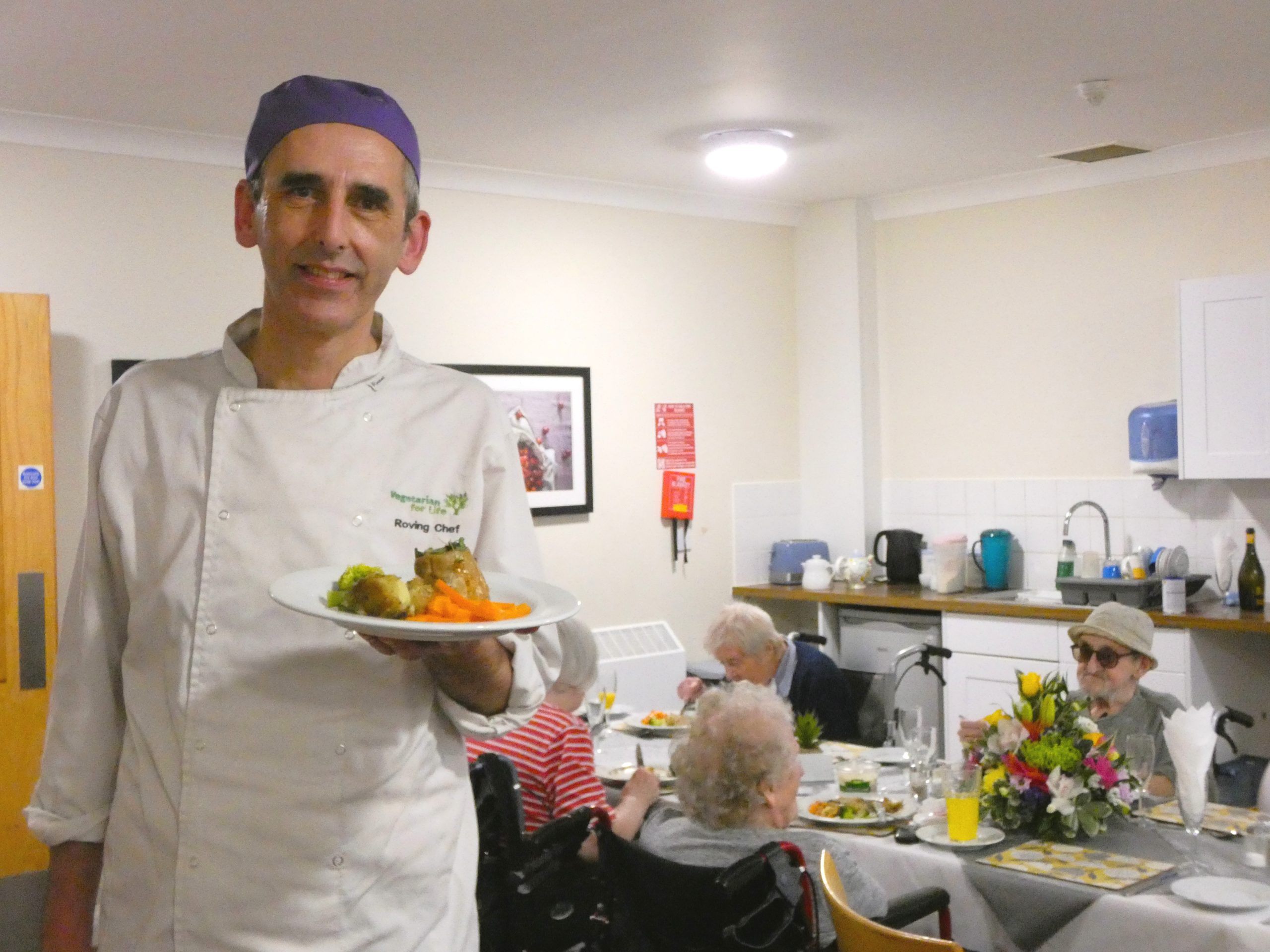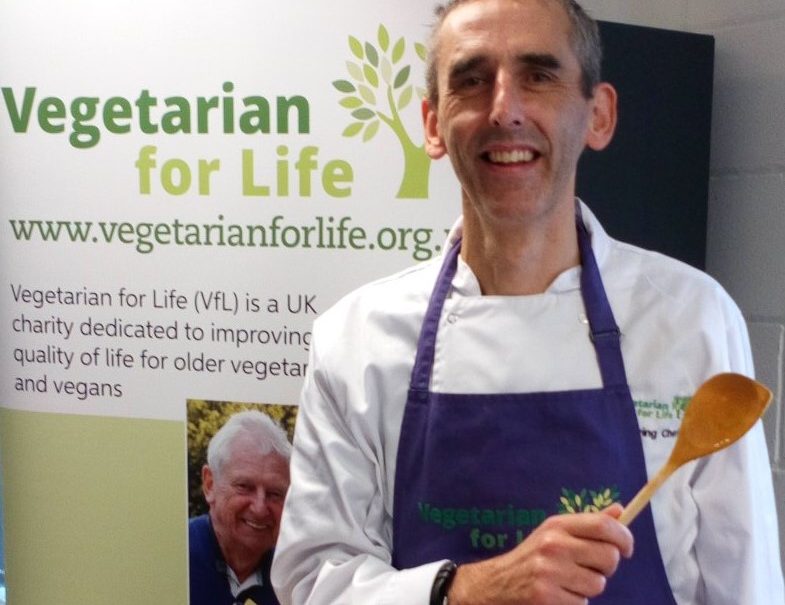As the number of older vegans and vegetarians is rising, many care homes in the north have adopted their menus accordingly – thanks to a roving plant-based chef who has made it his mission to demystify vegan cooking by showcasing its endless possibilities.
I am some caterers’ worst nightmare. What do you mean you’re dairy-free and egg-free and fish-free and meat-free?
As a result, they’ll give me a piece of fruit, a bag of salted crisps or a look that says “too bad”. Sometimes all three at once.
But this is not the case for all vegans in Manchester.
Since 2019, chef Alex Connell has travelled around the north to train care home caterers, carers and trainee chefs, among others, in all things plant-based.
His expertise has been much needed in recent years as the popularity of meat-free diets has grown at an unprecedented rate.
The latest data from The Vegan Society shows that 7% of the population in England and Wales now follow either a vegan, a plant-based or a vegetarian diet. Out of those, one in five is over 65.
Working for Vegetarian for Life (VfL) – a charity aimed at improving the catering provision to older vegans and vegetarians in the UK – the 56-year-old roving chef has conducted over 200 plant-based cookery demonstrations.
“I need to be culturally and demographically sensitive when I’m choosing the dishes,” chef Alex said, adding that he avoids recipes that are “wild and wonky”.
He has found that the best way to introduce people to meat-free cooking is by making meals that are naturally or easily vegan, rather than attempting to veganise traditional meat dishes.
“I want people to just enjoy the food for the sake of it being lovely food, and not think ‘Oh, this needs to have meat in it’,” he said.
Choosing from the recipes available on VfL’s website, chef Alex has taught participants how to make everything from root vegetable tagine, leek and potato soup and egg-free noodles to Lancashire hot pot, apple cake and sticky toffee puddings – recipes he is very familiar with.
Because chef Alex has been vegetarian or vegan almost his whole adult life. He went to university in 1990 to study philosophy, and it was an argument about animal rights in one of his classes that made him give up meat.
He said: “I kind of mashed up what was probably Peter Singer with some other stuff and thought ‘Well, if you can’t be certain that it’s wrong to do something, then why do it?’
“And that was the sort of philosophy that guided me.”
Peter Singer published the first edition of his book Animal Liberation in 1975, arguing that society’s treatment of animals is morally indefensible because animals’ interests in avoiding suffering is just as strong as ours.
“University should be a safe environment for discovering who you are beyond academic stuff. I was finding my identity,” he said.
But it would be another nine years before chef Alex was able to convert his passion for cooking into a career. After having taught at South Trafford College for six years, he successfully applied for an Education Officer role at The Vegetarian Society in 1999.
“I thought this is really what I want to do because it would give me opportunity to do small cookery demonstrations, write recipes and also be involved in education,” he said. “That’s when I really got into cooking and started taking it more seriously.”
He went on to join the Youth Hostel Association before landing a managerial role at The Vegetarian Housing Association in North Wales. Then, he returned to Manchester and started working for The Vegetarian Society again – this time as the Principal Tutor at their cookery school.
He said: “I’ve always loved cooking, and I know that it’s a cliché to say, but I really have. Some of my earliest memories are making bits of pastry with my mum.
“I remember as a child looking at cookery books and not being able to read, and so, whenever I’d see a picture of fruit jelly, I just couldn’t work out how the jelly got in the mould. Jelly is solid!
“I didn’t realise that you melt the thing.”
One of the things chef Alex loves most about his job is sharing fun memories like this with his participants and hearing how their relationship with cooking is.
“It’s all about talking to people and trying to draw them beyond the pot of food that’s going on. Food is more than just nutrition; it’s a cultural thing; it’s a shared experience.”
And that remains his focus during the sessions – sharing the joy of vegan food, not the principles behind it or his own reasons for avoiding animal products.
“Unless somebody asks me, I don’t ever go on about veganism and vegetarianism. I don’t want to make anyone feel uncomfortable in the room. You know, I’m a guest in there,” he said.

About a third of chef Alex’s classes so far has been for carers, care home caterers and trainee chefs. But most of his participants belong to social groups, such as Age UK, Women’s Institute or U3A – a nationwide network encouraging retired or semi-retired to come together to learn new skills – church groups and dementia support groups, to name a few.
Care home operator HC-One hired chef Alex last year to teach their chefs and kitchen assistants about vegan and vegetarian cooking at the Food Sorcery College in Manchester.
Group Development Chef Victoria Meakin said: “We cater for every diet in HC-One care homes, but we have also noticed more and more of our residents choosing to eat less meat and more plant-based foods.
“That’s why giving our Chefs the confidence to introduce delicious vegan and vegetarian dishes into our homes not only meets this growing demand but also encourages a more diverse diet and promotes resident well-being across the board.”
She said chef Alex’s dishes showcased “the endless possibilities of plant-based cuisine” and helped “demystify” it altogether.
Featured image courtesy of Vegetarian for Life (VfL)




